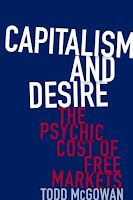Desire is the desire to desire. What does this mean? For Lacan, the logic of desire operates on lack, not fullness. Think of your favorite song that you listen to over and over, or watching a movie such as Star Wars or The Lord of the Rings repetitively.
For Lacan, these "empirical" objects stand in for what he terms the object cause of desire, or sometimes referred to as the "lost object." As long as the lost object remains lost, desire sustains its force. Listening to a favorite song or watching a movie repeatedly - both objects stand in for the lost object, but can never be the "thing" itself. And because this empirical object (song, movie, book, coffee, etc.) can not fill the shoes of the psychical lost object, desire continues to desire.
Slavoj Žižek offers a great example of the lost object using Coca-Cola's old slogan: "Coke is It." Žižek asks: What is this "it"? Why do we keep drinking coke if "it" is indeed "it"? There is a failure in drinking Coca-Cola that keeps us drinking more. Why? Because Coke is not it. This is the logic of desire. As long as we keep "missing" the lost object, desire continues to desire.
Desire also has a temporal component which can be found in classical Hollywood narrative. Classical narrative films exemplify the notion of desire because they demonstrate that the story's solution resides in the future. Die Hard (1987) is a great example of the logic of desire and classical narrative form.
John McClane (Bruce Willis) finds himself alone in the Nakatomi building where Hans Gruber (Alan Rickman) and his group of thieves seize the tower and hold a group of employees hostage, including John's estranged wife, Holly (Bonnie Beldelia). John's goal is to outsmart Hans. John is constantly backed into a corner as we wonder how he will survive. The goal is for John to win - to reach his goal - to defeat Gruber.
It is no surprise that this winning aspect of desire has a strong correlation to the logic of capitalism as explored in Todd McGowan's outstanding book, Capitalism and Desire.
Lastly, although desire operates on lack, it paradoxically provides the subject pleasure. This is why Lacan argues that the lack of lack (to be lacking lack) equals anxiety. We enjoy our desire. For example, I love to collect DVDs. I think the worse thing that can happen to me is to lose my desire for buying DVDs.











No comments:
Post a Comment